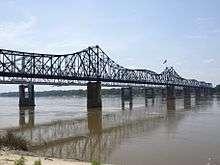Louisiana State Route 4
| |
|---|---|
| Route information | |
| Length: | 182.12 mi (293.09 km) |
| Existed: | 1924 – 1955 |
| Major junctions | |
| West end: |
|
|
| |
| East end: | Mississippi state line at Vicksburg |
| Highway system | |
| |
Louisiana State Route 4 (LA 4) was a state highway in Louisiana. It spanned 182.12 miles (293.09 km), making it one of the longest pre-1955 state routes. It was originally established as a numbering of the Dixie Overland Highway auto trail, and later served as a portion of US 80.
Route description
"Beginning at Mississippi River east of Delta, through Tallulah, Delhi, Rayville, Monroe, Ruston, Arcadia, Gibsland, Minden, to Shreveport." - 1924 Louisiana Legislative Route Description
LA 4 was a numbering of the auto trail named the Dixie Overland Highway, a route that spanned from San Diego to Georgia. LA 4 began where LA 1 turned south towards Natchitoches, and continued east through Shreveport and Bossier City, using the Long-Allen bridge over the Red River. LA 4 trudged through north Louisiana, meeting LA 90 and LA 11 in Minden, before entering Ruston and meeting US 167/LA 5. East of Ruston, LA 4 passed through Monroe, crossing on the Lea Joyner Bridge across the Ouachita River.
East of Monroe, LA 4 passed through small towns and some larger cities, like Rayville, Delhi, and Tallulah, meeting LA 47, LA 16, and LA 3, respectively. LA 4 then met Delta as the last town before crossing the Old Vicksburg Bridge to cross the Mississippi River into Vicksburg.
Realignment in Monroe
In 1935, LA 4 faced the first major shift in alignment, when the state highway was moved onto the Lea Joyner Bridge across the Ouachita River, bypassing the older Endom Bridge and Desiard Street. LA 4's shift in alignment meant a surge in art deco structures, many of which are still standing along Louisville Avenue. Desiard Street still retains the older buildings from the turn of the 20th century to this day.
Gallery
-

The old Vicksburg bridge, where LA 4 crossed the Mississippi River
-

Looking down the former LA 4, known as Texas Street, in downtown Shreveport
-
Abandoned theater in Rayville, LA on LA 4
-
Choudrant High School in Choudrant, LA
.svg.png)